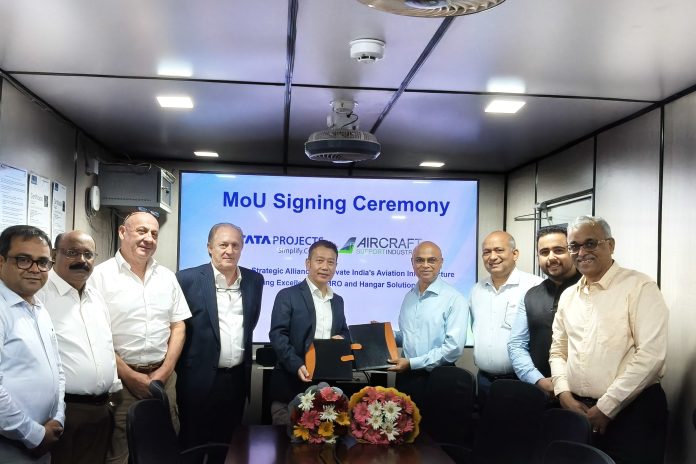 ASI Global has signed an exclusive Memorandum of Understanding (MoU) with Tata Projects (TPL) to collaborate on the development of aircraft maintenance facility requirements throughout India. ASI’s sister company, Aircraft Support Industries, is a leading provider of aviation infrastructure solutions and Tata Projects one of India’s most admired sustainable technology led engineering, procurement, and construction (EPC) companies.
ASI Global has signed an exclusive Memorandum of Understanding (MoU) with Tata Projects (TPL) to collaborate on the development of aircraft maintenance facility requirements throughout India. ASI’s sister company, Aircraft Support Industries, is a leading provider of aviation infrastructure solutions and Tata Projects one of India’s most admired sustainable technology led engineering, procurement, and construction (EPC) companies.
The strategic partnership paves the way for the two companies to jointly identify and pursue opportunities related to the burgeoning demand for aircraft maintenance hangars and supporting infrastructure from commercial airlines, third-party MRO’s, business aircraft operators and the defence sector. In addition to the initial focus on aviation related projects the companies will work jointly to pursue opportunities through their combined strengths leveraging on ASI’s engineering expertise, including the ‘Stressed Arch’, for applications such as airport terminal buildings, exhibition and conference halls, sports centres and bulk storage facilities.
ASI’s CEO Mark Langbein said: “We are immensely proud to be a part of this exciting relationship with Tata Projects, one of the largest and most respected companies in India, and together we can offer clients looking to build aircraft maintenance facilities a truly unparalleled service. Our extensive experience in aircraft hangar design and construction and our engineering capabilities, coupled with Tata Projects proven track record in delivering substantial and complex infrastructure projects throughout India, we provide a very compelling case to the market. Add to this Tata’s in house steel fabrication capability we are truly offering a one stop solution with support from the ground up.”
Commenting on the partnership, Vinayak Pai, MD & CEO, Tata Projects, said: “We are delighted to formalise our collaboration with ASI Global. This partnership marks an important step in delivering world-class, state of the art MRO facilities for India’s rapidly growing aviation sector. By combining Tata Projects’ integrated EPC expertise with ASI Global’s specialist engineering strengths, we will offer clients a true one-stop solution—delivering MRO infrastructure as ready-to-operate assets. Together, we are setting new benchmarks in innovative design, reliability, quality, and on-time delivery, while supporting the growth of India’s aviation ecosystem.”
GE Aerospace expanding Pune, India location
GE Aerospace has announced a US$14 million investment to expand capacity at the company’s Pune manufacturing facility as the site completes a decade of successful operations. This investment builds upon the US$30 million announced last year. The new investment will strengthen the site’s capabilities through upgraded manufacturing processes and automation, including enhancements that support advanced engine components.
“Our team in Pune has built strong capabilities, and with the support of a country-wide network of suppliers, has delivered components for some of our most advanced commercial jet engines, with safety and quality at the forefront,” said Vishwajit Singh, Managing Director of the Pune facility, GE Aerospace. “This investment reflects our commitment to the Make in India initiative and to advancing India’s role in global aerospace manufacturing.”
The Pune facility, which began as a multi-business manufacturing site, has since evolved into a high-tech aerospace parts supplier for GE Aerospace’s global commercial engine factories. Today, the site is supported by a network of more than 300 suppliers serving the Pune facility, part of the over 2,200 suppliers GE Aerospace partners with across India. Over the past 10 years, the facility has trained more than 5,000 production associates in precision manufacturing processes, playing a vital role in developing local talent. The site is also ISO 14001 and ISO 45001 certified, reflecting GE Aerospace’s commitment to sustainability and operational excellence.
The facility’s success is driven by FLIGHT DECK, GE Aerospace’s proprietary lean operating model, that emphasises safety, quality, and efficiency. With FLIGHT DECK, the site has reduced waste, improved process efficiency, and increased output while enhancing shop-floor safety. On a new line for a critical component, it has also achieved shorter lead times, higher productivity, and reduced downtime.



















